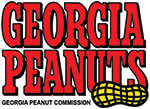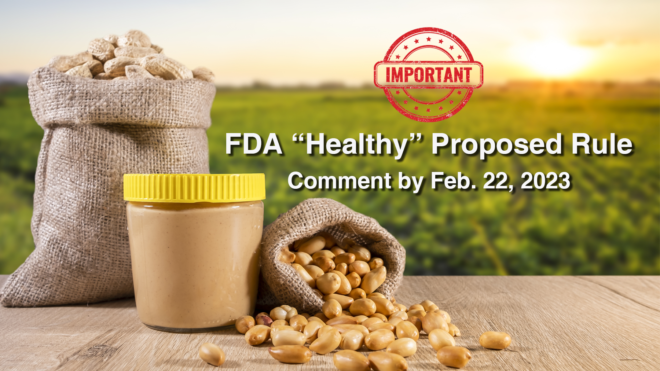Jan. 12, 2023 – The U.S. Food and Drug Administration (FDA) has published a proposed rule to update the definition of the “healthy” claim on food packaging to help improve American diets. The proposed rule would align the definition of the “healthy” claim with current nutrition science, the updated Nutrition Facts label, and the current Dietary Guidelines for Americans. Read the proposed rule here.
The Georgia Peanut Commission and the U.S. Peanut Federation are requesting peanut growers and industry stakeholders to submit comments (comment template included below) to the FDA using this link. Submitting comments ensures that the message of the peanut industry strong and clear for the FDA to take into consideration for the final rule.
Food Labeling: Nutrient Content Claims; Definition of Term “Healthy”
Template Comments (Copy and Paste into Federal Register comment link)
Docket No. FDA-2016-D-2335
Template Comments to Submit:
The U.S. Food and Drug Administration (FDA) has published a proposed rule to update the definition of the “healthy” claim on food packaging to help improve American diets. This proposed rule would align the definition of the “healthy” claim with current nutrition science, the updated Nutrition Facts label and the current Dietary Guidelines for Americans.
We applaud the effort by FDA to update the definition for the implied nutrient content claim “healthy” to be consistent with current nutrition science and Federal dietary guidance, especially the efforts made to emphasize dietary patterns rather than focusing on specific nutrients. However, we do have some concerns regarding portions of the regulation that may exclude certain food products, such as peanut butter, under the current proposed “healthy” definition.
- Although peanuts are naturally low in saturated fat, we agree with the proposed rule provision that includes all nuts in the definition of healthy, regardless of saturated fat content.
- While we agree that there should be an emphasis on including nutrient-dense protein foods in the definition, we are concerned that certain nutrient-dense foods, such as peanut butter, may be automatically excluded based on the strict proposed restriction of 0% DV added sugar.
- While we agree with the emphasis that the FDA has placed on healthy dietary patterns, we are concerned that the proposed rule may connect the public to whole foods but not healthy dietary patterns. In order to avoid erroneously excluding products for mixed foods, we believe that the added sugar and saturated fat limits for mixed foods should be consistent across all food groups.
Scientific evidence shows that peanuts provide health benefits for Americans at every stage of life including pregnancy, infancy, childhood, adulthood, and older adulthood. Additionally, peanuts are an energy-dense, nutritious food that fits into many healthy dietary patterns. The varied forms of peanuts and peanut products, including peanut oil, peanut butter, and peanut powder allow for increased versatility in various diets. Lastly, there is evidence that peanut consumption can aid in the prevention of at least three of the most prevalent diseases in the United States, including heart disease, cancer, and diabetes.
We appreciate the opportunity to provide comments on the Food Labeling: Nutrient Content Claims; Definition of Term “Healthy” regulations. The peanut industry has long been committed to educating and advocating for healthful lifestyles across all communities. Peanuts and peanut products are an inexpensive, accessible, and nutrient-dense food that have been proven to have a plethora of health benefits for consumers.
###
The United States Peanut Federation (USPF) is comprised of the Southern Peanut Farmers Federation, the American Peanut Shellers Association, and the National Peanut Buying Points Association, and other organizations. USPF serves as a unified voice in Washington, D.C. for all sectors of the peanut industry and advocates actively for strong agricultural policy. For additional information, please contact the USPF at (202) 543-7464.

